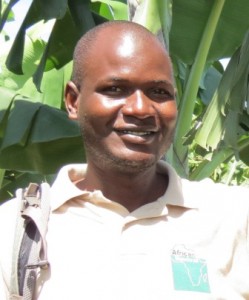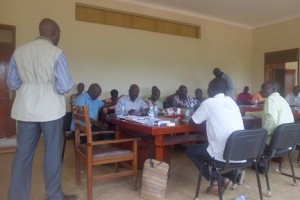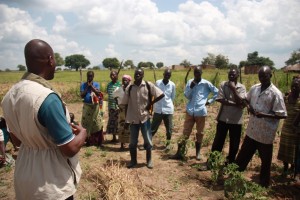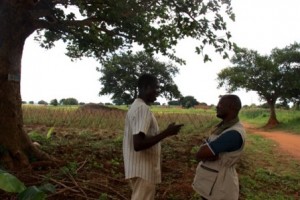The future is bright…
November 25, 2015 Francis is our Livelihood Project coordinator. He joined AR about 4 years ago after working for the Norwegian Refugee Council(NRC) where he also worked on food security and livelihood projects. As he quickly rose from a project assistant to the team leader, he was able to put his management skills to the test before coming to AR in in 2011/2. Back then, when his contract with NRC ended…
Francis is our Livelihood Project coordinator. He joined AR about 4 years ago after working for the Norwegian Refugee Council(NRC) where he also worked on food security and livelihood projects. As he quickly rose from a project assistant to the team leader, he was able to put his management skills to the test before coming to AR in in 2011/2. Back then, when his contract with NRC ended…
I was looking for a job, but there was also the interest to develop the organisation in other dimension. I knew the organisation more as an institution that works with education primarily – so when the job advertisement came for the livelihood department, I found it was a good opportunity to also diversify and also expand on the scope of activities of the organisation, to the areas also of livelihoods, and specifically where extensive agriculture can be practised and integrated in the work that African Revival is doing.
AR is a great organisation. In size and scale of implementation, I see it growing and developing, compared to the time when I joined. So I think it is a good thing to be in the organisation and also to be offered the opportunity to grow and also develop together with the organisation which is one thing I like, compared to another organisation where you go, and it’s already grown and there is no room for expansion, no new concepts, no ideas, no new project, no new innovations – I think I wouldn’t want to work for such an organisation. I prefer growing and developing an organisation, like this one.
I have managing roles, I have technical roles, and then I also have supervisory roles. In my general role, I have to manage, human resources and non-human resources. So I coordinate and supervise field staff and I manage financial resources, ensuring that budgets that are located for activities are handled accordingly. It’s a day-to-day role that I do and I enjoy doing it, especially with staff who are also willing and are very positive towards work.
In my technical roles, by the virtue of my training as an agricultural expert, I make sure that, I monitor the quality of the services delivered by the field staff to the beneficiaries. If it is training on agriculture, I contribute towards designing and drafting the training materials, and then ensure that he trainings are delivered accordingly. If the training requires practical session, I also take part in the demonstration by supervising. If the field staff needs to be supported, then I also come, if there is a technical area which surpasses their understanding and field of expertise.
 And then also I manage the different partnerships which African Revival has with the different stakeholders, for example, with the district, local government, where we are implementing our projects.
And then also I manage the different partnerships which African Revival has with the different stakeholders, for example, with the district, local government, where we are implementing our projects.
My staff are very hard-working, very competitive and very innovative. So they are actually the basis for the success of the school gardens projects. I enjoy a lot working with them and again, they also enjoy a lot their work. It is very much beneficiary and very resourceful team of staff, that I am working with and I am proud.
And currently our staff, Babra and also Bosco are pursuing further studies. They are getting more professional qualifications – Denis was recruited with a certificate, so now he’s upgraded to a Diploma holder. Babra was recruited from Diploma, now she is upgrading to a degree – which are all very good development upgrades. And at one point they had to ask for my endorsement and recommendation to add onto their cover letters for admission to the universities and institutions. So I am also happy to be part of their personal developments, which I know is going to contribute to their performance in delivering the project implementation to the beneficiaries.
When it comes to challenges, there is none other than field challenges which are the things that we have to deal with on a day-to-day basis, on a week-to-week basis, issues of crops not performing well, issues of pest and diseases and issues of weather changes.
But of course one thing is very apparent: funding is key – that I cannot underestimate. So where funding sources are limited, also the activities, the scale and also the geographical location, where we have to implement is limited, and that means we cannot expand and grow a lot, which is for me a bit frustrating,
 About the SDG project, it’s a very good project, and compared to the many projects that I have worked with, this has a unique benefit which is both for primary and also secondary – It has the multiply effect! So the greater part of it is the element of empowerment of the parents, the community and also the pupils.
About the SDG project, it’s a very good project, and compared to the many projects that I have worked with, this has a unique benefit which is both for primary and also secondary – It has the multiply effect! So the greater part of it is the element of empowerment of the parents, the community and also the pupils.
When I look at the communities especially the parents, the support we give them through the trainings and then the seeds support for agriculture production and also the initiation of VSLA, gives them the means to become self-reliant and then take charge of their household incomes, their household food security and also their dependants – in which case, the dependants here, our target and interests are on the learners, which are the pupils. So with this project, that empowers the parents to earn money, to grow enough food which can support their family and pupils perform better, is the perfect strategy or methodology for me, that works in a school community.
But also, the other benefit is, that it also targets the pupils directly, they’re also equally empowered with the life skills of farming, so that in the event, they do not get adequate support from the parents, they can pick up from a level that is not completely zero, they at least have a reference point to start from – or if in the event their education does not go as planned, they have a fall-back position: they can resort to farming and with the knowledge of entrepreneurship, farming as a business, they can make money, they can live their own lives, they can become mostly self-reliant and will seize to be completely dependent on other people.
So I would say the project is achieving it’s objectives, but also at the same time growing. Based on the good performance and the successful implementation, it was funded again in Nwoya for another year, and then in Abim and Agago for two years! And then building on the successes again, the idea was accepted by Bestseller Foundation for Amuru. So for me this is proof of the success of the project and also a success story that we can say and live to build on, and then scale out to the other districts which have not yet had the opportunity to benefit from this project!
 Sustainability is an issue, but the project is sustainable even if we leave. It is about the engagement of the various stakeholders and then ensuring that they play their roles. Like this project is dependent on the school, and the key stakeholders are the parents, the teachers and then the pupils. So if these people are engaged and properly oriented on how they should handle the project, I have no doubt that sustainability is not an issue. And there is a percentage which, we call group development fund, 30%, which is retained by the group for the school demonstration gardens, that they use to renew the seeds to redo themselves for subsequent seasons, especially now that we are not supporting them.
Sustainability is an issue, but the project is sustainable even if we leave. It is about the engagement of the various stakeholders and then ensuring that they play their roles. Like this project is dependent on the school, and the key stakeholders are the parents, the teachers and then the pupils. So if these people are engaged and properly oriented on how they should handle the project, I have no doubt that sustainability is not an issue. And there is a percentage which, we call group development fund, 30%, which is retained by the group for the school demonstration gardens, that they use to renew the seeds to redo themselves for subsequent seasons, especially now that we are not supporting them.
But most important is the integration of the school demonstration gardens into the school development plans – which is actually the gateway to the sustainability of the school gardens, because the school development plans is the major framework of any development activities in the school and it also has the capacity to allocate resources including financial resources to all these activities. So where we have been, we recommended this and in some schools we helped the schools to integrate the SDG into the school development plans, so that during their annual general meetings, they allocate funds to renew the gardens work when there is no support from us.
In Nwoya, we monitored 15 and they were still continuing with the methodology and concept of the school demonstration garden. And the institutions and structure we built there already, the group structures with their memberships, their leaderships and also with the establishment of some perennial crops, like bananas, which keep fruiting year and year out, which has been well established and very successful. It is already a permanent garden, that keeps them coming back, even if they want to do otherwise. So the impression already and the work, which was done over the project time has lived to sustain itself in many of the schools.
Other than funding at the coordination level, there are no real challenges – the future is bright. This project, it has an unlimited and overwhelming demand from the beneficiaries, it is only resource limitation that makes us not meet those demands, but with even substantial or adequate funding, the future of this project is bright and we can reach and cause tremendous change in the school communities across the country, with specific concern to the northern district where there is a gap.
